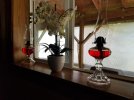Cash can work in a community even after collapse if everyone agrees to honor the value. Very important to have community agreements to work together, watch each other’s backs.As a possible answer for the OP, I don't think abandoning cash entirely is smart. Up and until it won't be accepted, most of us still have bills to pay. On top of that I'm reminded of some fictional post apocalyptic scenarios, I think the show Jericho was one (not sure), where for a short time folks still took cash, which sort of makes sense since people are used to accepting it. It could remain useful for a period.
Also very important (or useful) to be on good terms with people in power. This way you’re less likely to be messed with by shakedown artists.
As far as an investment, I’d recommend a good fireplace, wood, and some cast iron for cooking with such fire.
It might be good to have a cistern, or at least some way to collect rain water from downspouts. It can be filtered. Useful for many purposes. A well with a hand pump is a good idea too.

 . Seriously, I'm buying things that will help my community, trying to grow veggies with limited success except for potatoes, onions and leeks. Sourcing some great free range meat ATM and my chickens are doing well. Sent US $50 to the Chateau the other day, will send more if certain investments ripen in a favorable way!
. Seriously, I'm buying things that will help my community, trying to grow veggies with limited success except for potatoes, onions and leeks. Sourcing some great free range meat ATM and my chickens are doing well. Sent US $50 to the Chateau the other day, will send more if certain investments ripen in a favorable way!